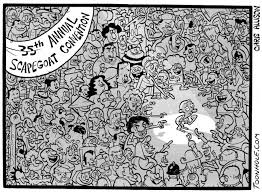Some weeks ago, short on the
heels of the election of the present set of legislators, a friend questioned
what would be the implications of a BJP-ruled State. There are a number of
responses that could be provided to this query, and one of them would be; ‘Who
knows? As of now, it looks as if it is not a BJP-ruled state, but a
Parrikar-ruled State.’

The claims being made for life
under Parrikar, are nothing short of utopian. Take for example, the rather encouraging
discussion, penned by a Veeresh Malik, of Parrikar’s ‘controversial’ reduction
of the cost of petrol.
Malik’s argument is that this decision by Parrikar, one
that has been labeled populist by some, and fool-hardy by others, is in fact
nothing short of laying the ground for the utopian in Goa, given that it “is a
brilliant move to plug revenue leakage caused by smuggling petrol into Goa and
by adulteration of petrol with kerosene; and the first step to improving
transport services.” There is no space in this column to discuss Malik’s
arguments, but they bear a good read, and perhaps evaluation by
political-economists who are more capable of a serious evaluation, not just of
Parrikar’s controversial action, but of Malik’s analysis as well.

An earlier installment of this
column, discussing the election campaigning, had suggested that there was a
danger to this singular focus on Manohar Parrikar. The danger is that Parrikar
‘(T)he man is no longer addressed as just a man, but per force becomes… the target
for the larger claims that are being made on his behalf.’ In other words, when
Parrikar is discussed, the discussion is not about him, but his name is merely
a platform for other discussions. The same caution holds good for the utopian
expectations that are being pinned on the new Chief Minister, and perhaps the
claims that are being made for him (if not by him). To promise, or to encourage
utopia is a double-edged sword, since we cannot ever really reach this magical
space, even as human progress is necessarily predicated on our striving for it.
More practically, what very often happens is that when our utopian ambitions
fail to materialize the golden boy of one moment, becomes the whipping boy and
scape-goat for the next. A good dose of realism therefore, even as we strive
toward these utopian goals would be very much in order.

To change track momentarily, but only
marginally, a lesson learned in the course of shifting from being a student of
law to that of anthropology, has been that rather than judge from predetermined
positions of right and wrong, black and white, (as the lawyer is wont to do);
one should be open to listening to what the people one is working with are
saying. Rather than dismiss what they are saying, because it does not fit into
our preconceived notions, the anthropologist must strive to make sense of what
they are saying. This exercise, to be sure, requires some amount of
interpretation, but at the end of the day, it requires us to carefully sift
through popular discourse and listen for the sounds we have not been expecting
to listen to. It was such an ethic that caused this
column to make a turnaround with regard to the politics of the controversial representativecurrently from Santa Cruz, and then from Taleigão. The politics of Mr. Monserrate,
that may appear offensive to some, are in fact the liberatory politics of
others. We may not agree with it, in deed we may see problems in it, but we
cannot deny the fact that his returning time-after-time to legislative power is
indicative of the aspirations of a good amount of people. The democratic
imperative does not require us to silently agree with the majority opinion; it
does however require us to positively engage with it, compromising at times,
countering at others, but always, as in the anthropological exercise, giving
respect to the groups one is in conversation with.

This is not to suggest however,
that this column will turn into another roll of fanfare for Mr. Parrikar.
(pause for smile). What this column will however attempt to do; is to inquire
what one is to make of the utopian (and other) responses to the helmsman-ship
of Mr. Parrikar. In other words, is there another way of looking at the
situation, that isn’t Jeremiad?

As many have already suggested,
the victory romp of the BJP into the Goan Legislative Assembly should not
necessarily be seen as a pro-BJP wave, but an anti-Congress wave. Let us take
the statement beyond the obvious however and point out that perhaps this is
more than just a motion against a particular party, but indeed against a
particular kind of politics that amply marked the period of Congress rule in
the state for the last five years.
Perhaps there is too great an awareness of the fact that regardless of
its rhetoric, the BJP once in power, could fall victim to similar patterns of
behavior. It is for this reason then, that there is this fervent acclamation of
Parrikar. Given his personal credibility as an honest person, and an efficient
administrator has never really been suspect, Parrikar can be very easily read,
as indeed he is, as more than just a member of the BJP. He is being read as the
harbinger of radical change in the Goan polity.

It is this demand for a
difference that is perhaps the single-most interesting feature of these
obsessions both for and against Parrikar. Clearly Parrikar has become the
symbol of a desire for change, and is being presented with a wide variety of
agendas that diverse segments of the population wish to see fulfilled. There are equally other groups that are
opposed to these agendas, or simply opposed to Parrikar (both as an individual
and as representative of the agendas he stands for). These diverse opinions are
finding voice and will necessarily battle it out in the public sphere. They
will first acclaim Parrikar for the change that they hope he will bring. When
he is unable to, or does not, or simply fails, for no fault of his own, but for
larger systemic reasons, to meet up to their expectations, he will be bitterly
criticized. This will launch another round of soul-searching, discussion,
introspection. This kind of discussion, this public hankering for change, and
the demand to see it realized can only be good, in terms that it will, for
better or worse, ensure that there is no business-as-usual in our otherwise
petty Goan republic. It will mean a public sphere alive with discussion, and
charged, after that long winter of ideologically-poor, and opportunistically
rich, politics. This much we can expect during the time of Parrikar as CM. And
even if for this reason alone, it appears that his presence must be welcomed,
like the bitter pill that purges the system of rot.
(A version of this post first appeared in the Gomantak Times dated 10 April 2012)

No comments:
Post a Comment